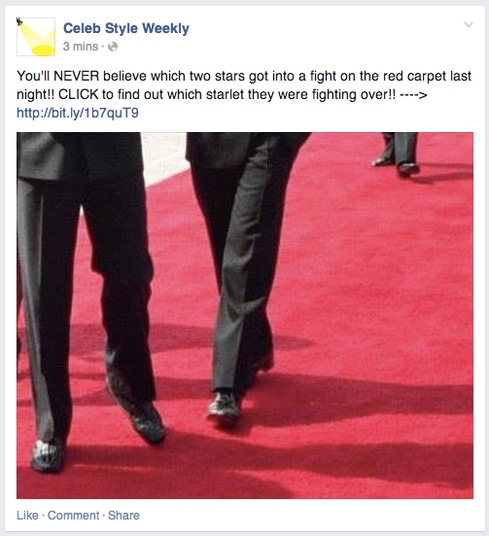You'll never believe what happens next! Facebook imposes new content standards for businesses that use click-bait tactics.

Businesses beware: Facebook's latest change to its news feed algorithm could affect whether or not you reach your audience.
The social network announced Monday that it will downplay page posts that employ click-baiting tactics, such as posting a link with a headline that encourages people to click to see more. These posts, which may read, "You'll never believe what happens next!" or, "This will blow your mind," have grown more common as brands try to improve click rates and visibility in users' news feeds, the social network said.
"Posts like these tend to get a lot of clicks, which means that these posts get shown to more people, and get shown higher up in News Feed," Khalid El-Arini, a research scientist at Facebook, and Joyce Tang, a product specialist there, wrote in an announcement. "Over time, stories with 'click-bait' headlines can drown out content from friends and pages that people really care about."
[Cut down on clutter in your news feed. Read 5 Facebook Spring Cleaning Tips.]
Facebook surveyed users to find out what type of content they prefer to see in their news feeds. A vast majority of the time (80%), people said they wanted headlines that helped them decide if they wanted to read the full article before they clicked through, the social network said.
To determine which posts are click-baiting, Facebook will take into account how long people spend reading an article away from Facebook. For example, if someone clicks an article and spends time reading it, the social network will deem the content valuable. But if users click a post and then return to Facebook, it suggests that they didn't find something they wanted, the company said.
Facebook will also consider the ratio of people who click a link compared to the people who discuss it and share it with friends, the social network said. If a lot of people click a link but few "like" it or comment on it on Facebook, for example, the social network won't deem the content valuable.
"A small set of publishers who are frequently posting links with click-bait headlines that many people don't spend time reading after they click through may see their distribution decrease in the next few months," El-Arini and Tang wrote. "We're making these changes to ensure that click-bait content does not drown out the things that people really want to see on Facebook."
Cleaning up click-baiting is Facebook's latest move to tidy up users' news feeds. In April, the social network announced plans to crack down on spammy content, such as photos or videos that users and pages repeatedly upload and posts that explicitly ask users to comment or like.
Facebook also announced it would target "like-baiting" posts from people and pages. These posts ask readers to like, comment, or share the post in order to get more distribution. According to Facebook, these types of posts are 15% less relevant than other stories with a comparable number of likes, comments, and shares.
This year, Facebook also said it would downplay automatically shared posts from applications, such as photos your friends liked on Instagram, the songs they listened to on Spotify, or the DIY projects they pinned on Pinterest.
"We found that stories people choose to explicitly share from third-party apps are typically more interesting and get more engagement in news feed than stories shared from third-party apps without explicit action," Facebook's Peter Yang wrote in a blog post.
In its ninth year, Interop New York (Sept. 29 to Oct. 3) is the premier event for the Northeast IT market. Strongly represented vertical industries include financial services, government, and education. Join more than 5,000 attendees to learn about IT leadership, cloud, collaboration, infrastructure, mobility, risk management and security, and SDN, as well as explore 125 exhibitors' offerings. Register with Discount Code MPIWK to save $200 off Total Access & Conference Passes.
About the Author(s)
You May Also Like







